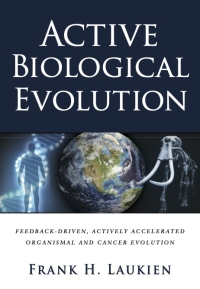Active Biological Evolution

The underlying active mechanisms of change generation, which enable efficient adaptive evolution, have eluded biologists for decades. Until now...
The prevailing scientific view still holds that organismal and cancer evolution is largely a function of accumulated random genetic mutations and natural selection.
While inefficient random mutations were the primary mechanism of evolution during early life on Earth that still play a prominent role in pathobiology...
in the modern era of biology, genomic adaptive change generation prior to Darwinian selection is primarily the result of feedback-driven, active cell biology processes.
The takeaway is clear: the Active Evolution concept can explain not only the efficient evolution of advanced molecular, cell, and organismal biology processes, but also finally rationalize the origins of complex traits and new species. In short...
the processes of adaptive evolution are, themselves, evolving.
In Active Biological Evolution, you will learn that...
- The Modern Synthesis theory and the Central Dogma are insufficient to explain the rapid, active, and more efficient adaptive evolutionary processes of the last billion-plus years.
- While random mutations remain important in monogenic diseases, cancer driver mutations, and viral evolution, they play a negligible role in the modern adaptive evolution of organisms.
- The Active Evolution framework integrates vertically heritable and horizontally transferable genome changes, as well as short-term heritable epigenetic and epiproteomic changes.
- These active evolutionary processes also have a darker side—explaining accelerated evolution of metastatic, treatment-resistant cancers, the adaptability of viruses, and giving us pause on inherent risks of genetic engineering, DNA vaccines, and synthetic biology.
The new paradigm of Active Evolution underscores the fundamental interconnectedness of evolutionary processes—that, in short, “No genome is an island.”
Active Evolution promises to do nothing less than redefine the fields of modern evolutionary biology and of late-stage cancer evolution.
Active Biological Evolution Recommendations
Charles Darwin’s seminal book On the Origin of Species brought one of the greatest revolutions in science. … Fisher, Haldane, Wright and Huxley wrote the Modern Synthesis with genetics. … Waddington, Gould, Pigliucci and Müller brought us the Extended Synthesis. Frank Laukien and others have been extending the synthesis even further, emphasizing how evolution is not just random mutations, but actively accelerated and driven by feedback. … We are in the Age of CRISPR, [with] relevance of evolution to our daily lives, with potent medical implications.
—George Church, Professor of Genetics, Harvard Medical School; Author of Regenesis






